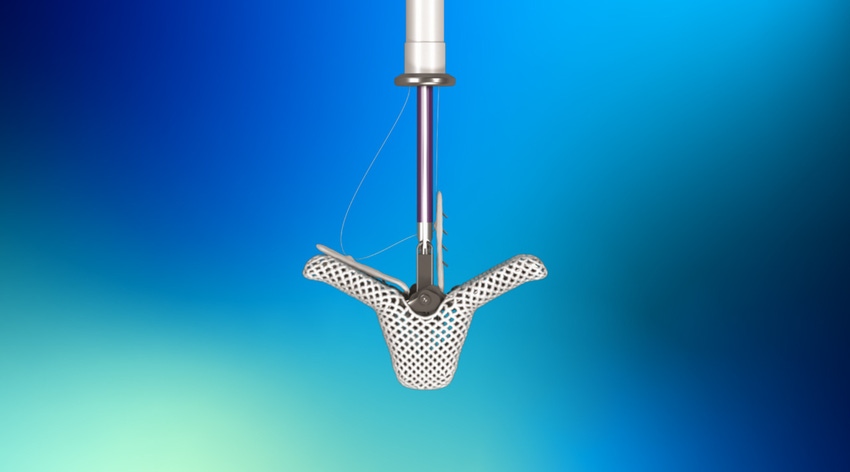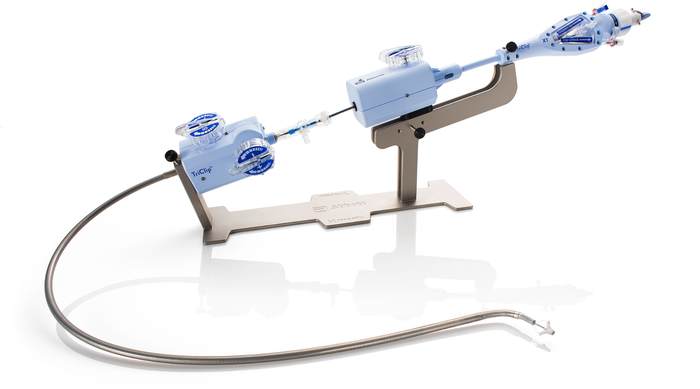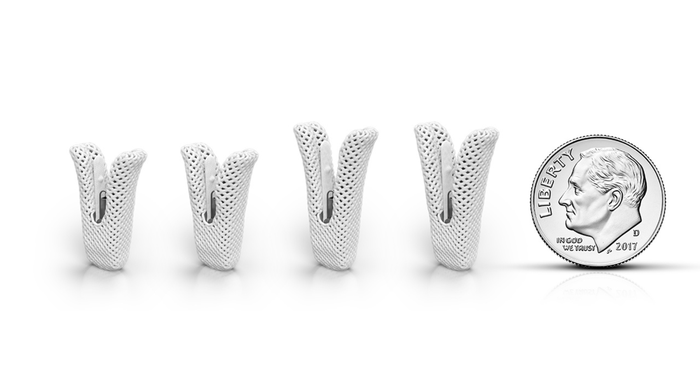What Abbott’s Big FDA Approval Means for the Tricuspid Device Market
U.S. patients suffering from a leaky tricuspid valve now have a new treatment option.
April 4, 2024

At a Glance
- In a pivotal trial, TriClip patients experienced a marked improvement in the severity of symptoms and quality of life
U.S. patients suffering from a leaky tricuspid valve, or tricuspid regurgitation (TR), have more treatment options than ever before, thanks to two significant FDA approvals.
FDA has approved Abbott’s TriClip transcatheter edge-to-edge repair (TEER) system for the treatment of TR.

Image of TriClip System courtesy of Abbott
TriClip leverages the same clip-based technology as Abbott's MitraClip device, which is designed to treat leaky mitral valves (mitral regurgitation), but the company specifically designed TriClip to treat the tricuspid valve's complex anatomy. This approval comes just two months after FDA approved Edwards Lifesciences’ Evoque transcatheter tricuspid valve replacement (TTVR) for the treatment of eligible patients with TR.
The TriClip approval was not a surprise, given that an advisory committee panel in February determined that the device is safe by a vote of 14-0, effective by a vote of 12-2, and that the benefits of TriClip outweigh the risks by a vote of 13 to 1.
Delivered through a vein in the leg, TriClip's TEER technology is designed to clip together a portion of the leaflets (flaps of tissue) to repair the tricuspid valve and help blood flow in the right direction without the need for open-heart surgery. On average, the procedure requires just one day in the hospital, Abbott noted.
Findings from the TRILUMINATE pivotal trial supported FDA approval of the TriClip. The randomized, controlled clinical study was designed to evaluate the safety and effectiveness of the device compared to medical therapy in people with severe TR who are at intermediate or greater risk for open-heart surgery. In the trial, 90% of patients who received the TriClip experienced a marked improvement in their TR grade, reducing from severe or higher to moderate or less at 30 days – a reduction that was sustained at one year. The trial also demonstrated a highly favorable safety profile, with 98% of patients being free of major adverse events through 30 days, and a significant improvement in quality of life.
“The U.S. approval of TriClip is a significant advancement for people suffering from tricuspid regurgitation, a heart condition that negatively impacts their quality of life and puts them at grave risk of serious health issues," said Paul Sorajja, MD, co-principal investigator of the TRILUMINATE trial.
Sorajja is the Roger L. and Lynn C. Headrick Family Chair of the valve science center for the Minneapolis Heart Institute Foundation and director of the center for valve and structural heart disease for the Minneapolis Heart Institute at Abbott Northwestern Hospital.
“With TriClip, physicians can offer patients a therapy option backed by excellent safety and effectiveness to help restore tricuspid native valve performance without subjecting them to high-risk open-heart surgery that may not be feasible for individuals with TR who are generally older and sicker,” Sorajja said.
For people who continue to have symptoms or persistent TR despite treatment with medical therapy and are not considered good candidates for surgery, TriClip represents an option that can improve their quality of life, according to Abbott.

TriClip valves in four different sizes, shown beside a U.S. dime for size comparison. Image courtesy of Abbott.
“This approval helps address a treatment gap for people with tricuspid regurgitation who previously had few options to treat a disease that adversely impacted their daily lives and could lead to other deadly conditions," said Sandra Lesenfants, senior vice president of Abbott's structural heart business. "With the addition of TriClip to our broad structural heart therapy offerings in the U.S., we are continuing to bring meaningful, life-enhancing benefits to patients with cardiovascular conditions."
TriClip has been approved for use in more than 50 countries, including in Europe and Canada, since its initial CE mark approval in 2020.
Marie Thibault, a medtech analyst at BTIG, noted that Abbott had applied for a new technology add-on payment (NTAP) under the acute inpatient prospective payment system for fiscal year 2025.
“Because the FDA approved the device before May 1, we think this means it will be eligible for the NTAP to go into effect on October 1,” Thibault wrote in a report this week. “This is a positive update, and we expect TriClip to be gradually adopted over time given the favorable pivotal data, unmet patient need, and [Abbott’s] commercial footprint in structural heart solutions.”
The analyst estimates that TriClip sales from outside the United States contributed about $100 million in revenue in fiscal year 2023.
Is quality-of-life benefit enough to make TriClip successful?
Analyst questions during previous Edwards’ earnings calls suggest that physicians may lean in on TTVR as opposed to TEER.
“This is a market we hear [about] from doctors a lot,” Robbie Marcus, a J.P. Morgan medtech analyst, said during Edwards’ third-quarter earnings call last October. “They may not be terribly excited about repair, but replacement could be a really exciting option.”
A question from Larry Biegelsen, a senior medtech analyst at Wells Fargo, during an Edwards earnings call last July raised further questions about replacement versus repair in the tricuspid valve.
“What would success look like to you, given the TRILUMINATE results showed only a quality-of-life benefit, but no positive trends on hard outcomes?” Biegelsen asked Edwards Lifesciences CEO Bernard Zovighian.
Zovighian struggled with Biegelsen's question, noting that TRILUMINATE evaluated a different technology, given that it's a TEER device rather than a transcatheter tricuspid valve replacement device. "So, it's very tough to comment on that, but I have to say that quality-of-life is super important for patients."
Daveen Chopra, Edwards’ corporate vice president of transcatheter mitral and tricuspid therapies made an interesting point, however.
"For us, I'm actually pretty excited by what we've seen actually previously with TRILUMINATE. It helps confirm outcomes that have come from other studies with TEER technologies that we have on PASCAL device, that TEER in tricuspid delivers great [TR] reduction with meaningful quality-of-life improvements and, we are excited to see randomized data," Chopra said. "So, to me, these are all great positive tailwinds in tricuspid ...”
About the Author(s)
You May Also Like




.png?width=300&auto=webp&quality=80&disable=upscale)